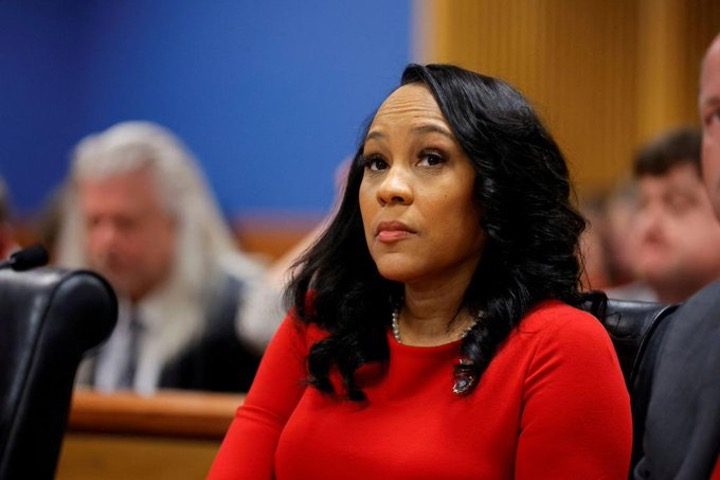
A breach of legal ethics and lapse in judgment weren’t enough to disqualify Fulton County, Georgia, District Attorney Fani Willis from continuing to prosecute Donald Trump for “election interference.”
While county Superior Court Judge Scott McAfee did not disqualify Willis, he clearly said mischief was afoot in her hiring boyfriend Nathan Wade to help prosecute Trump and other defendants.
Liberal legal analyst Jonathan Turley says McAfee’s “damning opinion” means that Willis is ethically bound to step down.
The Decision
McAfee conceded that Willis and Wade were romantically involved and traveled the world together, a key allegation from the defendants, with Willis reimbursing Wade in cash.
But the unusual arrangement between the pair is less important than what the evidence showed: The “financial gain flowing from her relationship with Wade was not a motivating factor on the part of the District Attorney to indict and prosecute this case.”
As well, McAfee wrote, “defendants argue that the financial arrangement created an incentive to prolong the case, but in fact, there is no indication the District Attorney is interested in delaying anything.”
But the nut of McAfee’s opinion is that he simply cannot disqualify Willis for what amounts to being stupid or shady:
Without sufficient evidence that the District Attorney acquired a personal stake in the prosecution, or that her financial arrangements had any impact on the case, the Defendants’ claims of an actual conflict must be denied. This finding is by no means an indication that the Court condones this tremendous lapse in judgment or the unprofessional manner of the District Attorney’s testimony during the evidentiary hearing. Rather, it is the undersigned’s opinion that Georgia law does not permit the finding of an actual conflict for simply making bad choices — even repeatedly — and it is the trial court’s duty to confine itself to the relevant issues and applicable law properly brought before it.
McAfee addressed the Willis-Wade link in detail, and wrote that Wade was “unpersuasive” in his testimony about his divorce and affair with Willis.
Willis paid and supervised Wade while they were involved romantically, McAfee found, and the exchange of money “raises the possibility and appearance that the District Attorney benefited — albeit non-materially — from a contract whose award lay solely within her purview and policing. … An outsider could reasonably think that the District Attorney is not exercising her independent professional judgment totally free of any compromising influences. As long as Wade remains on the case, this unnecessary perception will persist.”
Such was the testimony at the hearings that “an odor of mendacity remains.”
McAfee also ruled that Willis’ public claims about the defendants — that their motion was racially motivated — was “legally improper.”
McAfee gave Willis a choice: Either Willis or Wade had to step aside. Wade did so immediately, and so Willis will continue her nakedly political, racially motivated prosecution.
Turley: Not a Good One
Turley wrote that McAfee’s decision was not quite reminiscent of the biblical story about King Solomon and the two women who each claimed they were the mother of a baby. Solomon wisely decided to split the baby, which caused the real mother to give him up to the imposter.
“But if either Wade or Willis truly loved ‘their baby’ — the case against Trump — they would have removed themselves weeks ago,” he wrote:
Their personal controversies have derailed the case and mired the prosecution in scandal. Ethically, this should not have been a difficult question. They should have stepped aside.
That conclusion is more than evident in Judge McAfee’s decision, which shreds their claims on the stand and outside of the courthouse.
The court describes Willis’s controversial speech at a church as “‘playing the race card . . . to cast racial aspersions at an indicted Defendant’s decision to file this pretrial motion.”
Still, Turley backed McAfee’s explanation that the evidence did not “establish a strong basis for claiming that the case was brought or pursued due to this relationship or possible financial gain.”
“The purpose of this case was not personal but political,” Turley continued, and Willis is prosecuting Trump for the same crimes she and Wade committed: filing false statements.
“McAfee is no Solomon in this decision. He splits the accused to avoid making the harder decision,” Turley wrote.
Trump should be pleased, because the attempt to disqualify Willis left her “carrying more baggage than Amtrak.”
In his column and on X, Turley warned that the state and the Georgia bar might probe Willis’ claims. She still might be “removed or disqualified. That prospect does not appear to give Willis pause.”
It is not too late for Willis to act professionally in [the] best interests of her office and the people of Fulton County. She can step aside in light of the damning findings of the court. Otherwise, like the first woman in the trial with Solomon, she would rather see the baby sawed in half than give it up entirely.
On X, Turley wrote that “It is unimaginable how any prosecutor with a modicum of ethical awareness could remain [on] the case after this damning opinion.”



